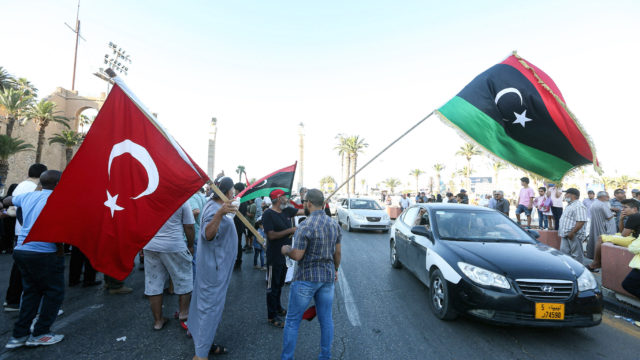
Briefs
Publication: Terrorism Monitor Volume: 18 Issue: 17
By:

Turkey Courts African States as France Seeks EU Partners
Brian M. Perkins
Turkey’s increasingly assertive military and economic role has seen the balance of power across several key regions begin to shift, particularly in the Mediterranean and the Maghreb, where Ankara’s role in Libya has significantly changed the geopolitics of North Africa. Ankara has sought to turn the tide of the Libyan war by attempting to enlist neighboring countries as military partners, and if that route fails, as more passive collaborators or supporters of Turkish involvement.
Tunisia, Morocco, and Algeria in particular, have unsurprisingly found themselves on the receiving end of Ankara’s largesse, much to the chagrin of other Maghrebi and European states (Middle East Monitor, January 27). France, specifically, is deeply concerned not only with Ankara’s designs on the eastern Mediterranean, but also Turkey’s courting of Algeria.
While Ankara would likely brim at the chance to gain Algeria’s military involvement in Libya—a prospect that is considerably slim due to the country’s dug-in stance of neutrality and its historical dogma of non-interference. Short of that support, Ankara still has much to gain from strengthening its diplomatic and economic relations with Algeria.
Close economic and security partnerships with countries in the region are likely to help blunt the outward perception of Turkey as a purely conquering force by demonstrating a commitment to mutually beneficial investment in the region as a whole, rather than simply doing so by force in the Maghreb’s most vulnerable state. That is not to say that under the surface Ankara will not engage in plans to influence domestic politics across the region—it surely will—but that its partnerships will be publicly touted as the opposite.
Strengthening ties with Algeria is also a powerful hedge against France and other European powers that have been particularly hawkish in their stance toward Turkish involvement in the region, particularly in Libya and the eastern Mediterranean. France’s waning influence in the region creates an opportunity for a significant shift to occur and for Turkey to become a preeminent force across the region. For its part, however, Algiers is unlikely to step back and jeopardize its relationship with France in any significant way in the near-term.
While Turkey is jockeying to gain partners in Africa, France has steadily increased its efforts to organize the Mediterranean states, including Egypt, in opposition to Turkey. Most recently, France has stepped up its efforts to swing Italy and Spain in favor of imposing EU sanctions on Turkey (Euro News, September 10). If France manages to lobby a unanimous EU vote for sanctions on the country, Ankara will have tough decisions on how to proceed with its power game across Africa.
***
Kadhimi Faces Tough Road to Expedited Election
Brian M. Perkins
The Trump administration’s plans to decrease the number of U.S. troops in Iraq from 5,200 to 3,000 will come at a critical time for the country and for Iraqi Prime Minister Mustafa al-Kadhimi. Kadhimi, who came to power after parliament approved a new government in May, inherited a country in crisis that is torn between the United States and Iran while still fighting the remnants of what appears to be a slightly resurgent Islamic State (IS). As if the task of righting the ship was not daunting enough, Kadhimi announced that the country’s next parliamentary elections would take place in June 2021, rather than the originally scheduled May 2022. In this shortened timeframe, Kadhimi will need to carefully position the U.S. troop drawdown in a manner that appeases the Iranian-backed Shia militias, which he simultaneously has in the crosshairs of his precarious crackdown on corruption.
Kadhimi has made little secret of his desire to restructure the government’s relationship with the Popular Mobilization Units (PMU) and his disdain for the groups that fall under its umbrella, but answer directly to Iran. This fact was particularly evident in late June when the Iraqi Counter Terrorism Service (CTS) raided the Kata’ib Hezbollah (KH) headquarters in Baghdad (Al Jazeera, June 26). His position toward the United States and Iran, however, has been intentionally ambivalent in public, allowing him to position himself as independent and make his anti-corruption campaign appear free from outside interference or motives.
The withdrawal of U.S. troops will, to a certain extent, help to appease the pro-PMU politicians who had earlier called for the government to expel the United States from the country. If, however, Kadhimi does not successfully wrest some power away from the Iranian-backed PMUs, it would risk creating a political imbalance that could allow for their continued preponderance working up to the snap election. On the other hand, too strong of a move against the PMU will almost certainly spell disaster for his time in office.
Much of Kadhimi’s actions thus far—including the anti-corruption campaign and election date change—have been in response to key demands from the mass protests that swept the country in late 2019. Gaining the support of the people is critical, but time and time again it has not proven to be enough in the face of a political field dominated by small, self-interested factions, many of which are directly connected to the PMU. Kadhimi’s best hope is likely to maintain his ambivalence to the United States-Iran conflict and tread carefully in who he ensnares with his anti-corruption campaign (Arab Weekly, September 19). Biding his time and avoiding creating the wrong enemies, be it the people or the PMUs, is likely the only way the Iraqi government will see any continuity.




